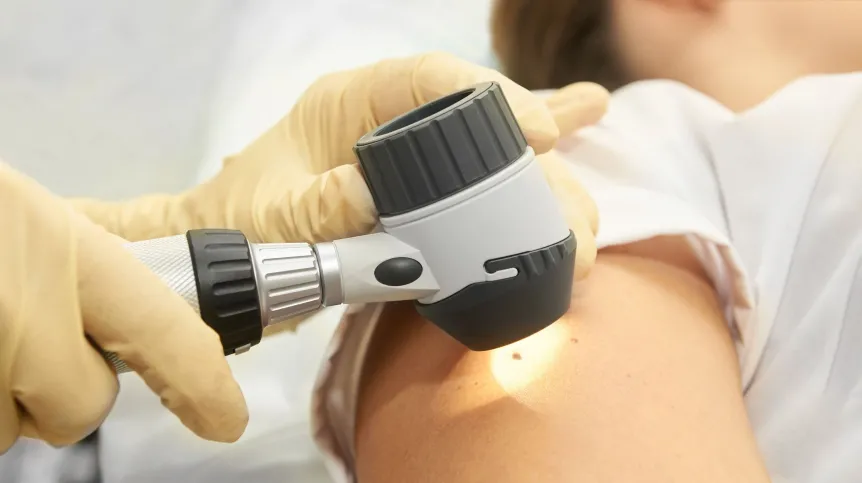
An international group of scientists, including researchers from the Maria Skłodowska-Curie National Research Institute of Oncology in Warsaw, published the results of research on preoperative immunotherapy in the treatment of stage III melanoma. Combination therapy with two drugs has shown clear effectiveness and - according to researchers - may change the standards of treatment.
The study, published in the New England Journal of Medicine, is one of the world's 12 most important clinical trials in oncology this year, the Maria Skłodowska-Curie National Research Institute of Oncology reports.
The research team included Professor Piotr Rutkowski and Dr. Joanna Placzke from the National Research Institute of Oncology and scientists from five countries. The research was conducted at the National Research Institute of Oncology in Warsaw and nearly 20 centres around the world.
The researchers tested the treatment of preoperative stage III melanoma with nivolumab and ipilimumab combination immunotherapy. The main objective of the study was to compare the effectiveness of treatment in which surgery is preceded by two cycles of combined immunotherapy with traditional postoperative treatment, i.e. one in which immunotherapy is administered after surgery for a year.
The research, initiated by research groups from the Netherlands and Australia, was academic and financially independent. 'We only received the drugs for pre-operative treatment', says Professor Piotr Rutkowski, quoted in the release.
Poland, thanks to its international reputation in the field of clinical trials, was one of the key countries recruiting for this project. Rutkowski says that '400 patients participated in the trial over a two-year period. After a very short observation period, less than a year, we that the event-free survival of patients was 26% better in the group that received only these two cycles preoperatively, compared to patients who received standard postoperative treatment’.
Moreover, the study showed an almost complete pathological response in nearly 60% patients, which in practice means that the melanoma has almost completely disappeared from the lymph nodes.
'This study may revolutionize the approach to the treatment of not only melanoma, but also other cancers, because instead of treating patients, in this case, for a year, we treat them for 6 weeks! I also believe that this study may become the basis for changing the drug program in Poland. This would allow for faster implementation of the new treatment method, because this treatment is not only more effective, but also cheaper, i.e. beneficial for both patients and the health care system', says Professor Rutkowski.
He also drew attention to the growing trend in oncology involving the use of pre-operative treatment. 'This approach allows us to assess the patient's response to treatment at a very early stage and, consequently, possibly modify the therapy after surgery, which is an important achievement in medicine', he says.
In Poland, the number of melanoma cases is systematically increasing. 'We currently diagnose about 4,000 cases of melanoma a year, but the number of cases doubles every 10 years. The correlation between skin contact with the sun without protection with a filter or clothing and melanoma is exactly the same as between smoking and lung cancer', Rutkowski warns.
Despite huge expenditures on commercially financed clinical trials, non-commercial trials are rare. In Poland, they have been financed by the Medical Research Agency for only four years.
'The example of this above study shows that non-commercial clinical trials initiated by doctors-scientists may result in significant changes in treatment standards. Therefore, I encourage scientists from the Maria Skłodowska-Curie National Research Institute of Oncology to apply in the current competition for non-commercial clinical trials and research experiments in the area of oncology, announced by the Medical Research Agency', says the science director at the Maria Skłodowska-Curie National Research Institute of Oncology, Professor Michał Mikula. (PAP)
PAP - Science in Poland
agt/ jjj/ kap/
tr. RL













